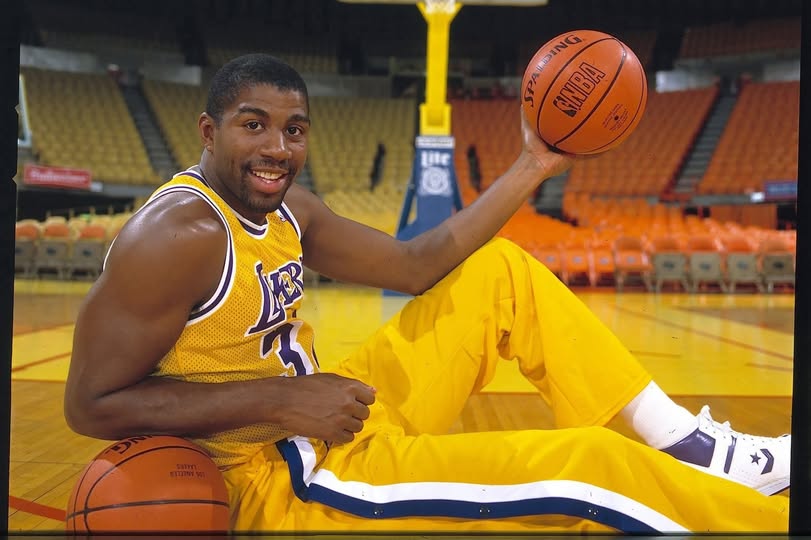When discussing NBA greatness, the conversation often circles around accolades—championship rings, MVP trophies, All-Star appearances, and career totals. But few metrics are as telling of a player’s impact on winning as playoff success. While many of the league’s greatest legends boast impressive postseason résumés, none among the NBA’s Top 50 players (as selected in the league’s 50th Anniversary Team in 1996) has a better playoff win percentage than Earvin “Magic” Johnson. With a postseason record of 128 wins and 62 losses, Magic’s .674 playoff win percentage stands as a towering testament to his winning legacy, eclipsing all others in his elite company.
This statistic is more than just a number—it encapsulates the essence of Magic Johnson’s career: a transcendent talent whose leadership, flair, and basketball intellect transformed the Los Angeles Lakers into a dynasty and helped define an entire era of professional basketball.
Magic Johnson entered the NBA as the first overall pick in the 1979 draft after leading Michigan State to a national championship. From the beginning, he was no ordinary rookie. His infectious energy, coupled with a 6’9” frame and uncanny court vision, allowed him to play—and dominate—at multiple positions, including a famously successful stint at center during Game 6 of the 1980 NBA Finals when Kareem Abdul-Jabbar was sidelined. At just 20 years old, Magic scored 42 points, grabbed 15 rebounds, and dished out 7 assists in that game, leading the Lakers to the title and earning Finals MVP honors. It was a prelude to a career defined by playoff excellence.
To truly appreciate Magic’s .674 playoff win percentage, one must understand the grueling nature of the NBA postseason. The path to a championship is lined with elite opponents, strategic chess matches, and high-stakes moments. Unlike the regular season, where stars may take nights off or teams may experiment with rotations, the playoffs are a pure test of a team’s mettle. Consistently winning in this environment is no small feat—and doing so over more than a decade is extraordinary.
Magic’s playoff résumé spans 13 seasons and includes nine trips to the NBA Finals and five championships (1980, 1982, 1985, 1987, and 1988). During that period, the Lakers were not merely a dominant team—they were the standard-bearers of excellence in the Western Conference and a central force in the league-wide revival of basketball’s popularity during the 1980s. The “Showtime” Lakers, as they were known, played a brand of basketball that was fast, entertaining, and ruthlessly efficient. At the heart of it all was Magic, orchestrating the offense with no-look passes, dazzling fast breaks, and an unshakable command of the game’s rhythm.
One of the most compelling aspects of Magic’s winning percentage is its consistency. While many great players had peaks and valleys in their playoff runs—some marred by early exits, injuries, or years stuck with mediocre supporting casts—Magic was consistently deep in the postseason, and more often than not, victorious. His teams made the Finals in nine of his thirteen seasons, an astounding rate that highlights both team excellence and Magic’s central role in it. He was a big-game performer who elevated not just his own game, but the games of those around him.
Compared to his peers among the NBA’s Top 50, Magic’s .674 playoff win percentage is not just impressive—it’s unmatched. Consider Michael Jordan, widely regarded as the greatest player of all time. Jordan’s playoff record stands at 119-60, giving him a win percentage of approximately .665. That’s close, but still behind Magic. Larry Bird, Magic’s great rival throughout the 1980s, finished his playoff career with a 66-54 record (.550). Even Kareem Abdul-Jabbar, Magic’s teammate and a six-time MVP, holds a playoff record of 154-85, which amounts to a .644 win percentage. These are legends of the game, yet none matched Magic’s ability to consistently win in the postseason.
Why did Magic win so much? Part of it comes down to his versatility. At 6’9″, Magic redefined the point guard position. He could run the offense, post up smaller guards, and guard multiple positions on defense. His size gave the Lakers unique flexibility, allowing them to push the pace on offense while maintaining size and strength in the half-court. More importantly, Magic possessed a rare basketball IQ. He saw the game unfold seconds ahead of everyone else, diagnosing defenses, manipulating matchups, and setting up teammates in optimal positions.
His leadership was also pivotal. Magic had a magnetic personality and a relentless drive to win. Teammates followed his lead, both in terms of effort and attitude. He was demanding, but uplifting; confident, but inclusive. This balance is difficult to strike, and it’s what made him such a potent leader on and off the court.
Beyond the numbers, Magic’s playoff performances are filled with iconic moments that underscore his greatness. The aforementioned Game 6 in 1980 is just one example. In the 1987 NBA Finals, he delivered the legendary “junior sky hook” in Game 4 against the Boston Celtics, a clutch shot over two Hall of Famers—Kevin McHale and Robert Parish—that helped the Lakers secure a 3-1 series lead. Time and again, Magic delivered in the biggest moments, whether through scoring, assisting, or simply controlling the game’s tempo.
Some may argue that Magic’s success was aided by playing alongside great teammates—Kareem, James Worthy, Michael Cooper, Byron Scott, among others. While it’s true that no championship is won in isolation, Magic was the engine that made the Lakers go. Many of his teammates had careers that were elevated by playing alongside him. Worthy, for example, flourished in the open-court system Magic thrived in, and Kareem extended his prime by having a generational playmaker deliver the ball in perfect position time and again.
Another factor to consider is Magic’s longevity in the playoffs despite a career that was shortened by his 1991 HIV diagnosis. Though he briefly returned in the 1995-96 season, the bulk of Magic’s postseason success came during a 12-year span—shorter than many of his contemporaries. That makes his .674 win percentage even more remarkable. He didn’t rack up easy wins during the early or twilight years of his career; virtually all his playoff games came at a time when he was competing for titles against the league’s best.
In evaluating playoff greatness, win percentage provides a clear, digestible metric. It isolates what truly matters—winning when it counts most. And in this regard, Magic Johnson stands alone among the NBA’s Top 50 players. His .674 mark reflects a career spent at the apex of competition, where pressure is highest and the margin for error thinnest.
Even decades after his final playoff game, Magic’s legacy is felt throughout the league. Modern point guards like LeBron James (himself a pass-first playmaker with elite size) draw constant comparisons to Magic for their style and versatility. The concept of “positionless basketball,” now widely accepted, was largely pioneered by Magic’s unique skill set. He was a player ahead of his time, and his winning ways remain a benchmark that current stars strive to match.
In a league rich with legends, accolades, and achievements, Magic Johnson’s record speaks volumes. With the highest playoff win percentage (.674) of any Top 50 player in NBA history, Magic’s name is forever etched not only in the history books but in the DNA of what it means to be a winner. He didn’t just play the game—he elevated it, defined it, and most importantly, won it.



